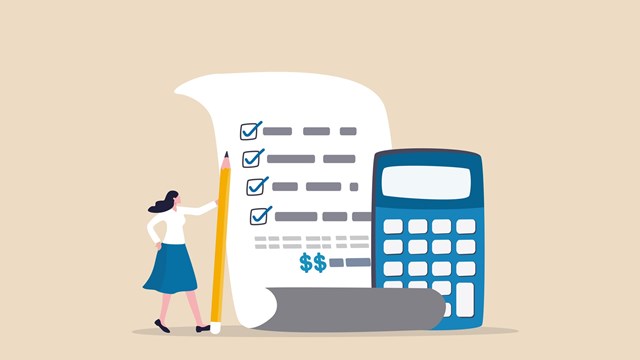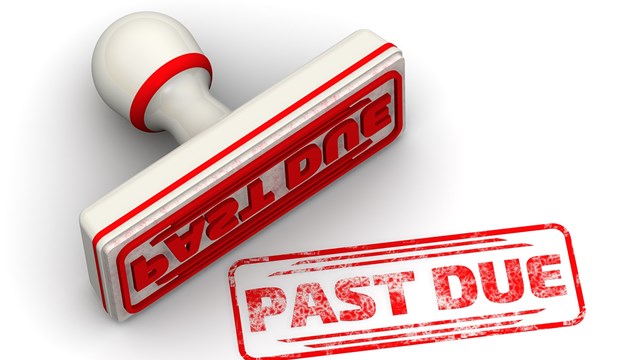Not everybody on a co-op or condo's board is an accountant (or can even balance their own checkbook, for that matter.) Handling the money for an entire association is a big responsibility however, and residents rely upon their board to make good financial decisions on behalf of the entire community and to protect its individual and collective assets.
Although the terminology is different, and the dollar amounts and orders of a much larger magnitude, at a fundamental level, managing the finances of a building or condo association is not so very different than managing your own finances. What is prudent for the latter is prudent for the former, and the mistakes people make managing their own money—using credit cards to pay for fixed expenses, for example—are the same ones board members often make.
Here are some financial basics, as well as a few common mistakes boards make when dealing with their proverbial pocketbooks—and how your board can avoid them.
The Birth of a Budget
According to Elmhurst-based accountant Brad Schneider of CondoCPA, the complexity of an association's budget varies depending on the size and sophistication of the association. “The larger the association, the more areas that will probably need more expertise,” says Schneider. “Most high rise condos in Chicago have budgets laid out by the manager, who goes line by line and tries to predict how much their service contracts add up to for the year.”
If a building or HOA leaves the budget-making up to their manager, it's vital that there's clear communication and transparency between both parties. “It depends on how much confidence you have in the manager,” says Schneider, “but as a board, you certainly want to review the budget. Some boards are more interactive that they'll get more involved with the operations.”
Other issues that arise during this formulation period are delinquencies, arrears, and upcoming capital expenses that will impact the year's bottom line. In as much as it's vital to know how much money will be flowing into the association's coffers, as well as what will be flowing out, it's also vital to know how much you can expect not to collect from delinquent residents in order to have the full financial picture.
What Am I Looking At?
According to accounting pros, the financial statements of a co-op or condo contain the same basic information as that of a commercial business. They include the balance sheet, statement of revenues, expenses and accumulated surplus or deficit—also known as retained earnings—the statement of cash flows, and notes on the various statements and items.
This basic outline includes the following:
A balance sheet reports assets, liabilities and the difference between the two, which is referred to as stockholders’ equity (condos use the term "fund balance" or "members’ equity"). Assets are presented in order of liquidity, and liabilities are presented in order of maturity.
The statement of revenues, expenses and accumulated surplus or deficit reports present information about revenues (maintenance or common charges, special assessments, interest income, administrative fees, etc.) and expenses (wages, real estate professional fees, taxes, etc.) The statement of revenues and expenses should also report the excess or deficiency of revenues over expenses for the period as well as a reconciliation of beginning and ending accumulated surplus or deficit with results of operations for the period.
The statement of cash flows is a reconciliation of the balance of cash at the beginning of the year to the balance at the end of the year. It provides an analysis of the excess or deficiency of revenues over expenses to cash flows operating, investing and financing activities. In short, it measures changes in the balance sheet, as well as the bottom line from operations to account for the change in the entity’s cash balance from one year to the next.
The notes to the financial statements provide additional explanations to certain line items on the financial statements as required by Generally Accepted Accounting Principles (GAAP). Some that are required by disclosures include the organization or legal form (corporation or association) of the entity, the location and number of units, summary of significant accounting policies, restrictions on cash or other assets, the components of property and equipment, mortgage information (including pledged assets), commitments and contingencies, and income tax filing status (including income tax liabilities and credits.)
Along with a well-organized management report, a good reserve study fortifies the backbone of a financially-stable HOA, says Steven Silberman, CPA, of the Deerfield-based firm Frost Ruttenberg & Rothblatt, PC. “That's key. All boards need to review those studies on an annual basis, because so many things happen each year. Maybe you delay a project...or you have to borrow from reserves. If that's the case, you have to change the funding plan that your reserve study has called for. We find that many boards are not reviewing those studies on an annual basis. What happens if an emergency comes up? They have to look at alternatives, which probably means special assessing the unit owners, or going out and trying to get financing to help bridge that gap. But what we're finding out here is that a lot of the financial institutions are not loaning to these associations unless they do have a plan in place for how they're going meet future financing of these major common elements.”
In > Out
In the plainest possible terms, the amount of money coming into an HOA community's coffers must exceed the amount of money going out. It's Economics 101, and yet many boards get in trouble when the black turns to red. If you make $5,000 a month, and the combined mortgage and maintenance fees on your condo are $5,001, that deficit is eventually going to become problematic. Ultimately, you have but two options: you can A) make more money, or B) move. Associations work the same way, but instead of a salary, the lion’s share of their revenue comes from the people who live in the community, through either maintenance charges or assessments. These must—must—be high enough to pay for the costs of operating the building.
According to Schneider, one of the most common mistakes associations make is maintaining their monthly or common charges at a level that's not sufficient to cover operating expenses. “I've seen a lot of places where they're unrealistic and overspend to the point where they have no reserves left,” he says. “And they look back and they say 'How did that happen?' It's because they kept borrowing just to make ends meet. I've seen some [HOAs] where they had over half a million dollars in reserve, and they end up with zero. And all because they didn't have a realistic operating budget.
Again, this is not rocket science. The math of it is easy to understand. It’s the politics that make it difficult. Ideally, the maintenance fees collected from residents are enough to cover operating costs, plus add a bit each month to the cash reserves. For operating reserves, that tends to fall somewhere around two percent of the monthly budget, according to most pros. “It's possible to hold the budget level, but only for maybe a year or two,” says Schneider. “We used to say if you didn't increase your budget three to five percent a year, you're just going to be borrowing from the reserves. So that was the rule of thumb. In the last couple of years, a lot of costs have decreased because of increased competition among vendors and contractors, so you might get by with not increasing it,” but that's not always going to be the case, and boards need to plan accordingly, he adds. Cash reserves are vital, in the event of emergency, and also to avoid having to resort to assessments for every little problem that crops up. A sufficient reserve should be set aside for future repairs and replacements. This modulates the HOA's cash flow and prevents unpredictable peaks and valleys.
With stricter controls being mandated by Fannie Mae and Freddie Mac, financial pros say that banks are keeping a watchful eye on the financial health of co-ops and condos in the event they have to sell the mortgages to the government. Lenders used to concern themselves solely with the creditworthiness of the borrower, but nowadays, financial advisers are warning their clients that lenders are looking at the financial condition of the building or HOA as well—especially the money held in both operating and capital reserve.
Watch the Store
It's not a bad idea for board members to ask themselves a few key questions to make sure the finances are humming along, says Silberman. “Is it just one person doing the budget?” asks Silberman. “Do they have adequate help? Are they getting competitive bids, or are they using a friend or somebody to try to do work? Are they looking at the future of the association, or are they saying, 'Hey, I'm only going to be here for two or three years' and trying to keep the assessments as low as possible?”
Also ask, “Are people paying their maintenance fees on time? Are a lot of people in arrears?” This is especially relevant now, with the effects of the recession still very much visible. There will always be a certain percentage of units in arrears, he says, just like unemployment will never be at zero, or literacy at 100 percent. But if a big swath of units are behind in paying their fees, that can herald a disaster—especially in a smaller co-op where the shortfall can’t be spread out among hundreds of owners.
“Do you have an ‘approved vendor’ list? The board should approve all vendors,” says Victor Rich, a director with financial consulting firm RSM McGladrey in New York City. That may sound like nitpicking, but he goes on to say that unapproved vendors may turn out to be overcharging the building and kicking back money to a board member. It happens more often than you think.
Also, “Do you have a backlog of accounts payable?” Just like in a private household, a stack of unpaid bills is never a promising sign. And just as the heads of a household should be in the loop about their accounts payable, all residents—not just board members—should look at the annual minutes. Can this be dull? Sure. But if everyone leafs through it, problems will be spotted. “If the minutes are thorough for the monthly board meetings—if there are monthly meetings, which there should be—and those minutes are complete and accurate,” says Rich, “you should get a good idea of what’s going on.”
And making that kind of information isn't just polite—it's the rule. In addition to the basic financial statements and notes mentioned above, accounting professionals say that the American Institute of Certified Public Accountants (AICPA) requires co-ops and condos to disclose supplemental information about the estimated remaining lives and replacement costs of the property and the funding of future major repairs and replacements. This analysis is crucial for boards in meeting their fiduciary duty and preserving their building. It is also their responsibility to decide how to fund the cost of future projects.
The Takeaway
The takeaway message is that while an HOA's financials might seem intimidating, keeping a community solvent is all about doing some homework to familiarize yourself with your building's financial profile, planning ahead with the help of experienced, competent professionals, and keeping things clear and well-supervised whenever money is concerned. “The key is planning,” says Silberman. “You've got to do enough planning ahead of time to make sure you're putting in place the proper budget, and making sure everybody's on the same page.”
With a conscientious, committed board and a group of competent professionals, managing your building's finances can be as easy as 1-2-3.
Greg Olear is a freelance writer, novelist, and a frequent contributor to The Chicagoland Cooperator.







Leave a Comment